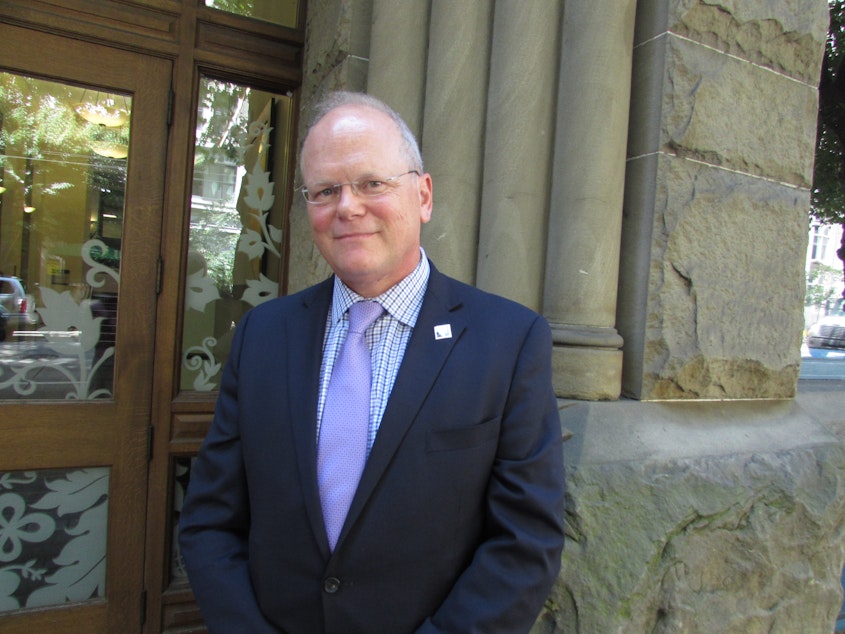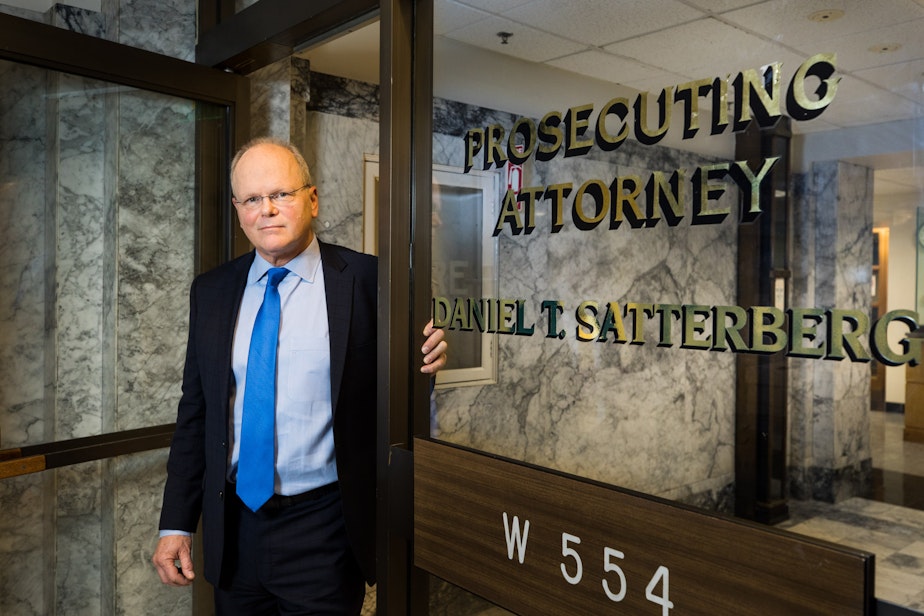Longtime King County Prosecutor Dan Satterberg won't seek reelection

After 15 years as the elected prosecutor in King County, Dan Satterberg announced he will not seek re-election this fall.
Satterberg called it a personal decision and said at age 61, after 37 years with the office, it’s a good time to do other things. Throughout his time on the job, he said he's tried to promote "change from within" the office.
He said he hoped the office will find a thoughtful successor at a time when the public is calling for action on violent crime and mass incarceration.
“It’s an excellent office, it doesn’t need to be dismantled or blown up or abolished or any of those things,” he said. “It needs some loving care, it needs a leader but it is full of really good people.”
Satterberg initially won the office as a moderate Republican in 2007, in the mold of his predecessor Norm Maleng. But before his most recent run, he sought a successful charter amendment to make the office nonpartisan.
“Then when I ran again [in 2018] the first question was, ‘we know the office is nonpartisan but what are you?’ That was right after President Trump was elected and seemed like a good time for me to say, ‘he doesn’t appeal to me and what that party stands for doesn’t appeal to me, and I identify more as a Democrat but also as an independent thinker.’”
Satterberg has been aligned in many ways with a movement of progressive prosecutors in major U.S. cities. Critics on the left in King County say his changes haven’t gone far enough — in his last run for office he was challenged by a public defender who wanted more dramatic changes to reduce incarceration.
Sponsored
But Satterberg said some prosecutors who have come from outside their office have struggled to make the changes they campaigned on.
“I think I stand for the proposition that you can make change from within. Most of the progressive prosecutors around the country have run ‘against’ the office. For instance in Philadelphia Larry Krasner on the first day fired 35 people. That’s a tough way to start your reign over the office,” he said.
In recent years Satterberg received national attention for his attempts to chart new approaches to drug offenses, after watching the prison population spike early in his career due to mandatory drug sentences.
He’s written about his own sister’s struggles with addiction after she passed away in 2018 and he’s talked about addiction as a disease that requires treatment, not prosecution.
“We can’t punish people out of a substance use disorder, and yes, my family like so many in the United States has had a personal loss due to substance use disorder,” he said. “It’s changed the way I’ve looked at this and the role the criminal justice system should have.”
Sponsored

For his remaining year in office, Satterberg said he’ll work to address the backlog in criminal cases that has built up during the pandemic. And he’s still working to expand diversion programs, where people avoid prosecution if they agree to work with a nonprofit like Choose 180.
These programs focused initially on young people, but in the next few months he says they’ll offer a version for adults as well.
“This is for adults 18 and over who are facing their first felony for a property offense, not violent offenses,” he said. “Because we know once you get that first felony, it seems like the second and third one are right around the corner.”
Satterberg also broke ground when he charged an Auburn police officer Jeffrey Nelson with second-degree murder and first-degree assault, stemming from the shooting death of Jesse Sarey in 2019.
Sponsored
It was the first time in decades that a police officer in Washington state was charged with the misuse of deadly force, and the first use of Initiative 940, where voters changed the standard to convict police officers of wrongful death.
Satterberg said the case “will be important because the loss of life in that case was important and, in our view, was so unnecessary.” Nelson has pleaded not guilty and is currently awaiting trial.
Satterberg said he’s concerned about gun violence and wants to keep up the “Shots Fired” data his office has been gathering on that issue.
He said while juvenile crime is at historic lows, he doesn’t support King County’s efforts to completely eliminate youth detention.
"Incarceration for juveniles is appropriate when they’ve shot and killed somebody,” which he said accounts for most of the 26 youth currently in custody in King County.
Sponsored
“You have to have a time-out,” he said. “Some amount of detention, to me, maybe because I’m a prosecutor and I maybe can’t wrap my head around the aspiration, some is always going to be necessary but we’re at a historic low right now and we should take advantage of that.”
King County Executive Dow Constantine has pledged to end youth detention by 2025 and close or convert the secure detention center for youth to other uses.




